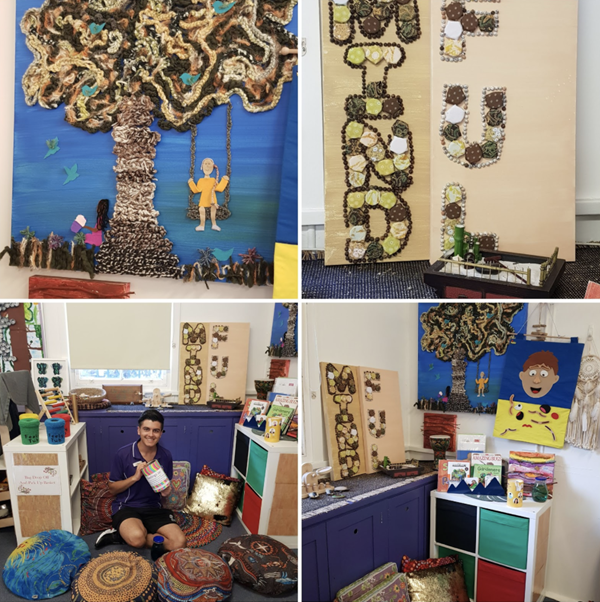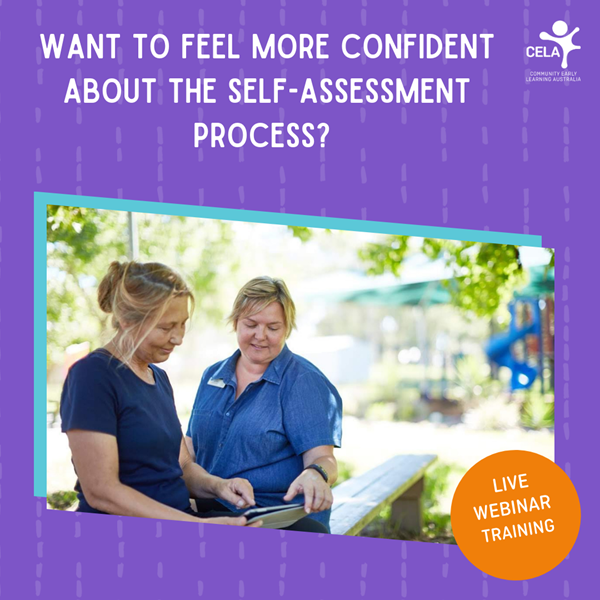How can you make your Exceeding Themes present during an A&R visit and what’s it really like to go through the online self-assessment process?
Sutherland Activity Centre Director Carena Hawkins (who celebrates 20 years at the service this week) shares learnings from opting into the NSW Department of Education’s online self-assessment process, along with the centre’s recipe for success.
By Carena Hawkins
Sutherland Activity Centre has been operating on the grounds of Sutherland Public School for more than 30 years. We received notification of our most recent Assessment & Rating in October 2019. We initially submitted our QIP in November, before being informed about the choice to opt in to the new online self-assessment process.
We had previously received an NQS rating of Meeting in 2015, and we were determined to achieve an Exceeding rating that truly reflected the quality of education and care offered at our centre. It didn’t take us long to decide to proceed with the opt-in self-assessment process, as we thought “who better to prove that we deserve an Exceeding rating than us?”
What followed was an intense couple of weeks. However, we were heartened by the fact that a lot of the information required was already in our QIP. Most of the additional work came down to elaborating on what we already had, being confident that we could demonstrate how our practice reflects all three Exceeding Themes, and that we had the evidence we would need to present on the day of the visit.
Making our Exceeding Themes present
It turned out that our preparation and planning were worthwhile, as we received an Exceeding rating in areas 1, 2, 4, 5 and 6, with a rating of Meeting in areas 3 and 7.
We were one of the first OOSH services in our area to go through the new process, and learnt an immense amount from the experience. This included developing a better understanding of how to really make our Exceeding Themes visually present at the visit, which involved supporting the themes with appropriate evidence which the officer could view at the visit.
Theme 1 – Practice is embedded in service operations
We showcased this through our focus on wellbeing in service operations and how this is linked to our philosophy.
Our philosophy is that we use our heads; to learn, share and establish relationships, our hands; to discover and be creative and our hearts; for kindness, caring and our beliefs . This philosophy and mindful approach is woven through all aspects of operations, which we were able to show examples of, including:
Flexible rostering
We consult our team prior to developing the roster to ask them whether they need time off so that they don’t feel guilty if they are rostered on and require some downtime.
Rostering above required ratios
Management has created an environment where there are more educators than needed according to ratios. Financially this can be hard, but once the numbers of children drop in the afternoon session, the educators are encouraged to do some professional development, reading or writing in their reflection diaries.
Consideration around team meeting times
Team meetings are very productive and usually, they are in the session, this allows the team to be more work orientated than, staying back or coming in early for a shift.
Focus on mindfulness and Be You training
Our educators have undertaken mindfulness training with a registered psychologist to learn skills to help themselves and the children be more mindful. All educators have taken part in the Be You program, which has helped them to have a better understanding of mental health challenges and has given us some great practical ideas to implement such as a mindfulness corner and feelings jar.
The feelings jar has been a great addition to the centre. It enables children who may not be comfortable to approach an educator about what they are feeling to write their feelings down and put it in a jar with their name on it so that the educators can gently approach them instead. The format of the meetings that Educators have with the children resulting from notes left in the feelings jar are always up to the children. The meeting could include a group of friends or take place as a private chat between the Educator and child.
The amazing thing about the BeYou modules, it has not only helped us to cement positive relationships with the children but to build even better relationships with our parents and guardians.

Our mindfulness corner enables children to have time on their own should they need it. The corner has many sensory resources to play with and explore.
Theme 2 – Practice is informed by critical reflection
We endeavour to promote a relaxed culture that values the contributions to the program of all educators. We have embedded a process to ensure that every team member is involved in the critical reflection process.
We begin by discussing an idea or issue within a team meeting. We then survey the stakeholders concerned to gather thoughts from all angles, whether that be everybody or just the children. From there we plan and reflect on how we can change the issue or introduce the idea. Once the idea has been implemented we ask for feedback on how the change or idea is working.
Every step is documented visually in our folders along with evidence ready for assessors should they wish to see it.
For example, our approach to Health & Safety has been through a great deal of critical reflection recently which has lead to many positive changes. Our Health & Safety Officer was able to confidently demonstrate how our critical reflections led to these changes on the day of assessment.
Theme 3 – Practice is shaped by meaningful engagement with families and/or the community
We pride ourselves on our engagement with families and the community and have many examples to share. One example which was relevant at the time of assessment was that we had helped a number of families to gain access to counselling and external service providers. We asked the families if they would be open to writing us a letter about the help we provided and were able to show these to the officer on the day.
Helping others to shine
Since our Assessment & Rating we’ve been able to provide a lot of mentoring to other local OOSH services that needed guidance, including many hours of phone calls and emails. We were incredibly happy to hear that they all received Exceeding ratings too.
One thing that I would say to anyone who is about to go through A&R is don’t be afraid of opting in to the online self-assessment process. It actually allows you to better articulate your strengths, guides you through the process and will set you up for a much more streamlined quality improvement process for the future.
We now update our self-assessment online on a regular basis instead of having a separate QIP document. The entire process is embedded in our centre and we keep up to date visual evidence for our themes in folders so that we’ll always be prepared.
A decade of growth
10 years ago we could not even afford a new ball. I’m incredibly proud of how our service has grown and flourished over the last decade, and that through the hard work and dedication of our team we have achieved our well-deserved Exceeding rating.
While strong financial management has kept us in a stable financial position, good people management has given us the reputation we needed in order to grow our enrolments and exceed community expectations. I’ve always ensured that we have the budget and human resources to be able to provide an above ratio service, which enables us to have a team that is well equipped to provide the best quality education and care.
Being a CELA member has helped us in many ways – most importantly it has given us the confidence to take on more challenges. CELA’s training has allowed our leadership skills to grow and flourish, allowing all educators to shine in their area of expertise.
We continue to use the Self Assessment tool as our Quality Improvement Plan so that we don’t need to double up on work and will be well prepared when our next A&R comes around.
Further reading:

Self Assessment 1 – Supporting the why, what and how of quality practices
Self-assessment 2 – Strategies to turn QIP strengths into visible and evidence based practice